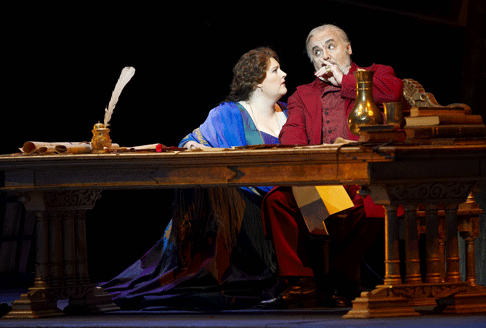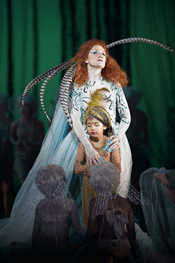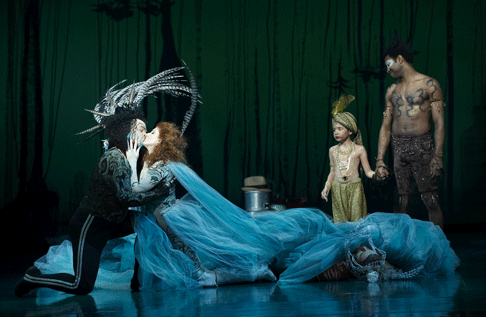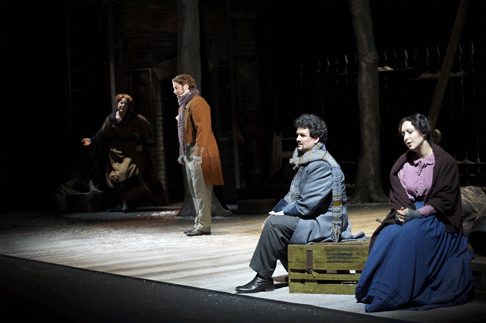![Tamara Wilson as Maria Boccanegra [Photo by Michael Cooper courtesy of Canadian Opera Company]](http://www.operatoday.com/simon04_COC.gif)
12 May 2009
Canadian Opera on the rise
How often does one experience an opera in which everything works — in which there is not one flaw either in the staging or in its musical dimensions?
English Touring Opera are delighted to announce a season of lyric monodramas to tour nationally from October to December. The season features music for solo singer and piano by Argento, Britten, Tippett and Shostakovich with a bold and inventive approach to making opera during social distancing.
This tenth of ten Live from London concerts was in fact a recorded live performance from California. It was no less enjoyable for that, and it was also uplifting to learn that this wasn’t in fact the ‘last’ LfL event that we will be able to enjoy, courtesy of VOCES8 and their fellow vocal ensembles (more below …).
Ever since Wigmore Hall announced their superb series of autumn concerts, all streamed live and available free of charge, I’d been looking forward to this song recital by Ian Bostridge and Imogen Cooper.
The Sixteen continues its exploration of Henry Purcell’s Welcome Songs for Charles II. As with Robert King’s pioneering Purcell series begun over thirty years ago for Hyperion, Harry Christophers is recording two Welcome Songs per disc.
Although Stile Antico’s programme article for their Live from London recital introduced their selection from the many treasures of the English Renaissance in the context of the theological debates and upheavals of the Tudor and Elizabethan years, their performance was more evocative of private chamber music than of public liturgy.
In February this year, Albanian soprano Ermonela Jaho made a highly lauded debut recital at Wigmore Hall - a concert which both celebrated Opera Rara’s 50th anniversary and honoured the career of the Italian soprano Rosina Storchio (1872-1945), the star of verismo who created the title roles in Leoncavallo’s La bohème and Zazà, Mascagni’s Lodoletta and Puccini’s Madama Butterfly.
Evidently, face masks don’t stifle appreciative “Bravo!”s. And, reducing audience numbers doesn’t lower the volume of such acclamations. For, the audience at Wigmore Hall gave soprano Elizabeth Llewellyn and pianist Simon Lepper a greatly deserved warm reception and hearty response following this lunchtime recital of late-Romantic song.
Collapsology. Or, perhaps we should use the French word ‘Collapsologie’ because this is a transdisciplinary idea pretty much advocated by a series of French theorists - and apparently, mostly French theorists. It in essence focuses on the imminent collapse of modern society and all its layers - a series of escalating crises on a global scale: environmental, economic, geopolitical, governmental; the list is extensive.
For this week’s Live from London vocal recital we moved from the home of VOCES8, St Anne and St Agnes in the City of London, to Kings Place, where The Sixteen - who have been associate artists at the venue for some time - presented a programme of music and words bound together by the theme of ‘reflection’.
'Such is your divine Disposation that both you excellently understand, and royally entertaine the Exercise of Musicke.’
Amongst an avalanche of new Mahler recordings appearing at the moment (Das Lied von der Erde seems to be the most favoured, with three) this 1991 Mahler Second from the 2nd Kassel MahlerFest is one of the more interesting releases.
‘And there was war in heaven: Michael and his angels fought against the dragon; and the dragon fought and his angels, And prevailed not; neither was their place found any more in heaven … that old serpent … Satan, which deceiveth the whole world: he was cast out into the earth, and his angels were cast out with him.’
If there is one myth, it seems believed by some people today, that probably needs shattering it is that post-war recordings or performances of Wagner operas were always of exceptional quality. This 1949 Hamburg Tristan und Isolde is one of those recordings - though quite who is to blame for its many problems takes quite some unearthing.
There was never any doubt that the fifth of the twelve Met Stars Live in Concert broadcasts was going to be a palpably intense and vivid event, as well as a musically stunning and theatrically enervating experience.
‘Love’ was the theme for this Live from London performance by Apollo5. Given the complexity and diversity of that human emotion, and Apollo5’s reputation for versatility and diverse repertoire, ranging from Renaissance choral music to jazz, from contemporary classical works to popular song, it was no surprise that their programme spanned 500 years and several musical styles.
The Academy of St Martin in the Fields have titled their autumn series of eight concerts - which are taking place at 5pm and 7.30pm on two Saturdays each month at their home venue in Trafalgar Square, and being filmed for streaming the following Thursday - ‘re:connect’.
The London Symphony Orchestra opened their Autumn 2020 season with a homage to Oliver Knussen, who died at the age of 66 in July 2018. The programme traced a national musical lineage through the twentieth century, from Britten to Knussen, on to Mark-Anthony Turnage, and entwining the LSO and Rattle too.
With the Live from London digital vocal festival entering the second half of the series, the festival’s host, VOCES8, returned to their home at St Annes and St Agnes in the City of London to present a sequence of ‘Choral Dances’ - vocal music inspired by dance, embracing diverse genres from the Renaissance madrigal to swing jazz.
Just a few unison string wriggles from the opening of Mozart’s overture to Le nozze di Figaro are enough to make any opera-lover perch on the edge of their seat, in excited anticipation of the drama in music to come, so there could be no other curtain-raiser for this Gala Concert at the Royal Opera House, the latest instalment from ‘their House’ to ‘our houses’.
"Before the ending of the day, creator of all things, we pray that, with your accustomed mercy, you may watch over us."
![Tamara Wilson as Maria Boccanegra [Photo by Michael Cooper courtesy of Canadian Opera Company]](http://www.operatoday.com/simon04_COC.gif)
How often does one experience an opera in which everything works — in which there is not one flaw either in the staging or in its musical dimensions?
Toronto’s Canadian Opera Company overwhelmed its audience with just such perfection in the production of Verdi’s Simon Boccanegra that opened the company’s spring season in the still-new Four Seasons Centre for the Performing Arts.
The staging, new at London’s Covent Garden a year ago, was directed by Ian Judge, who in addition to his credentials as one of today’s top international directors of opera, looks back on a quarter century with England’s Royal Shakespeare Company. Although the libretto for Boccanegra is largely by Francesco Maria Piave, Judge brought the insights of a major Shakespearean to Verdi’s 1881 revision of the work, first staged in Venice in 1857.
Judge has a strong sense of dramatic flow of “Boccanegra” and thus eschewed the divisions into acts and the in-between-curtains that traditionally interrupt it. With a single intermission after the curse that ends the Council scene, this was a staging, seen on May 3, that kept the audience almost breathlessly engaged throughout its three hours.
In the title role Italy’s leading Verdian Paolo Gavanelli headed a cast without a weak link. Especially for those who saw Dmitri Hvorostovsky in this role in San Francisco last fall, Gavanelli brought a new depth to the role.
Minus the Russian’s Hollywood handsomeness, Gavanelli’s Boccanegra was good generation older than the man played by Hvorstovsky. The result was a man of greater seriousness and experience, indeed a man Lear-like in his dignity and suffering. Vocally Gavanelli set the standard for the rest of the cast. Tamara Wilson, a young American soprano from Houston’s studio program, played Maria as a woman both intelligent and vulnerable and handled high notes with power or delicacy — as the moment demanded.
Canada’s Phillip Ens was impressive as Fiesco, and Russian Mikhail Agafonov was his equal as Adorno. Marco Guidarini, respected as a Verdi conductor throughout Europe, displayed a fine sense for both music and drama in his work with the COC’s excellent orchestra. And the chorus, rehearsed by Sandra Horst, was fully caught up in the drama.
Sets by John Gunter were traditional with touches of modernity in sloping walls and a titled pillar. Lavishly rich costumes were by Deirdre Clancy. Nigel Levings was responsible for unusually effective lighting.
Judge brought Shakespearean majesty to the death of Boccanegra, an aspect clearly in the mind as he indicated in a program note on the opera: “It has all the qualities of a Shakespeare play. Verdi loved Shakespeare. He wrote [here] a Shakespeare drama in his own way, and that’s what is terrific.” This was indeed and in every way a terrific Boccanegra!
 Tamara Wilson as Maria Boccanegra and Paolo Gavanelli as Simon Boccanegra
Tamara Wilson as Maria Boccanegra and Paolo Gavanelli as Simon Boccanegra
All in all, this production, although planned when the late Richard Bradshaw was still COC CEO, speaks highly of the commitment to continuing excellence by new general director Alexander Neef and recently appointed music director Johannes Debus. (Bradshaw had filled both offices.)
Second triumph of the COC spring season was Benjamin Britten’s Midsummer Nights Dream in a co-production with Houston Grand Opera, seen on its opening night May 5. For the staging of the 1960 work designer Dale Ferguson — responsible for both sets and costumes — created a dreamscape that drew the capacity audience into the world of enchantment that Britten made of Shakespeare’s drama.
Animation was brought to the diaphanous set in spring-like shades of green by an immense “sleep sheet” that spanned the stage and descended on Britten’s characters when they truly slept. Ferguson’s richly imaginative land — upside-down trees decorated the set — provided an ideal environment for the ethereal singing that distinguished the production.
 Laura Claycomb as Tytania
Laura Claycomb as Tytania
As Tytania and Oberon, rulers of the fairy world, Laura Claycomb and
Lawrence Zazzo led the large cast that was superb in both serious and comic
moments. Texan Claycomb, of course, is a leading figure on the international
opera scene, and with her often buoyant chiffon train was a major force in
making this production a transcendent experience.
And Zazzo, confined for the most part to a gondola swinging above the stage, sang with a voice of unusual resonance that places him a step above the many countertenors on stage today. Mezzo Kelley O’Connor, famous for her performances of Peter Lieberson and Oswaldo Golijov, was a beautiful Hippolyta, perfectly partnered by Robert Gleadow as Theseus.
Adam Luther (Lysander), Elizabeth DeShong (Hermia), Wolfgang Holzmair (Demetrius) and Giselle Allen (Helena) — excellent all — completed the company of confused lovers. The rustic troupe responsible for the play-within-the-play in Dream was delightfully led by Thomas Goerz, while Robert Pomakov was a touching Bottom. As Flute, the role written for Peter Pears, Lawrence Wiliford recalled that Britten wrote his bel canto aria as a send-up of Joan Sutherland, whom he had recently heard as Lucia.
 (l - r) Lawrence Zazzo as Oberon, Laura Claycomb as Tytania, Robert Pomakov (lying on ground) as Bottom and Jamaal Grant as Puck
(l - r) Lawrence Zazzo as Oberon, Laura Claycomb as Tytania, Robert Pomakov (lying on ground) as Bottom and Jamaal Grant as Puck
Jamaal Grant played Puck — a speaking role — with the joy of the prankster that the character is. Of special distinction was the contribution made to the staging by the well-trained children’s choir.
Director Neil Armfield and conductor Anne Manson worked together to underscore the need for a proper balance of foolishness and gravity in the opera — and in life.
Damien Cooper’s sensitive lighting added to the magic of this exemplary production.
Given the admirable quality of these two productions, it is difficult to understand that the COC could allow itself the embarrassing mediocrity of the Bohème that completed the company’s spring season.
The revival of the company’s traditional 2005 staging — sets and costumes by, respectively, Wolgang Skalicki and Amrei Skalicki — was cast largely with alumni of the COC Ensemble Studio now singing with Canada’s regional companies.
 Anna Leese as Musetta, Peter Barrett as Marcello, David Pomeroy as Rodolfo and Frédérique Vézina as Mimì
Anna Leese as Musetta, Peter Barrett as Marcello, David Pomeroy as Rodolfo and Frédérique Vézina as Mimì
David Pomeroy (Rodolfo), Peter Barrett (Marcello), Peter McGillivray (Schaunard) and Frédérique Vézina (Mimì) all failed to make emotional contact with the roles they sang.
Better qualified for her assignment as Musetta was New Zealand’s Anna Leese, yet she too was painfully over- directed by Maer Gronsdal Powell, heretofore assistant to numerous directors of COC productions.
On her own here, Powell was at a loss for meaningful ideas that might have brought a dramatic impact to the staging that ran its course with no sense of direction. And COC Derek Bate, on the podium on May 4, chose for the final act a dirge-like tempo that left one wondering whether Mimi was going to live forever after all.
Hard as it is to imagine a Bohème that leaves an audience dry eyed, that was the unhappy case here.
The Canadian Opera Company now ranks sixth among opera companies in North America. Statistics provided by Opera America list the six first in terms of budget: the Met, $252 million, San Francisco Opera, $70 million, Chicago Lyric Opera, $54.3 million, Los Angeles Opera, $51 million, and New York City Opera, $42 million. And in number of performances, the COC with 68 slated for the up-coming season, is third after the Met with 225 and Chicago with 72.
In the past two seasons — this is the third in Toronto’s Four Seasons Centre — the COC has played to 99% of capacity houses, which is the record in North America. In Chicago it has been 93%; at the Met, 90%. In the same period the COC’s annual subscription rate has been 75%, again a North American record. In Chicago the average is 68%; at the Met, 32%.
The COC is clearly a company on the rise!
Wes Blomster